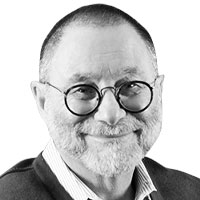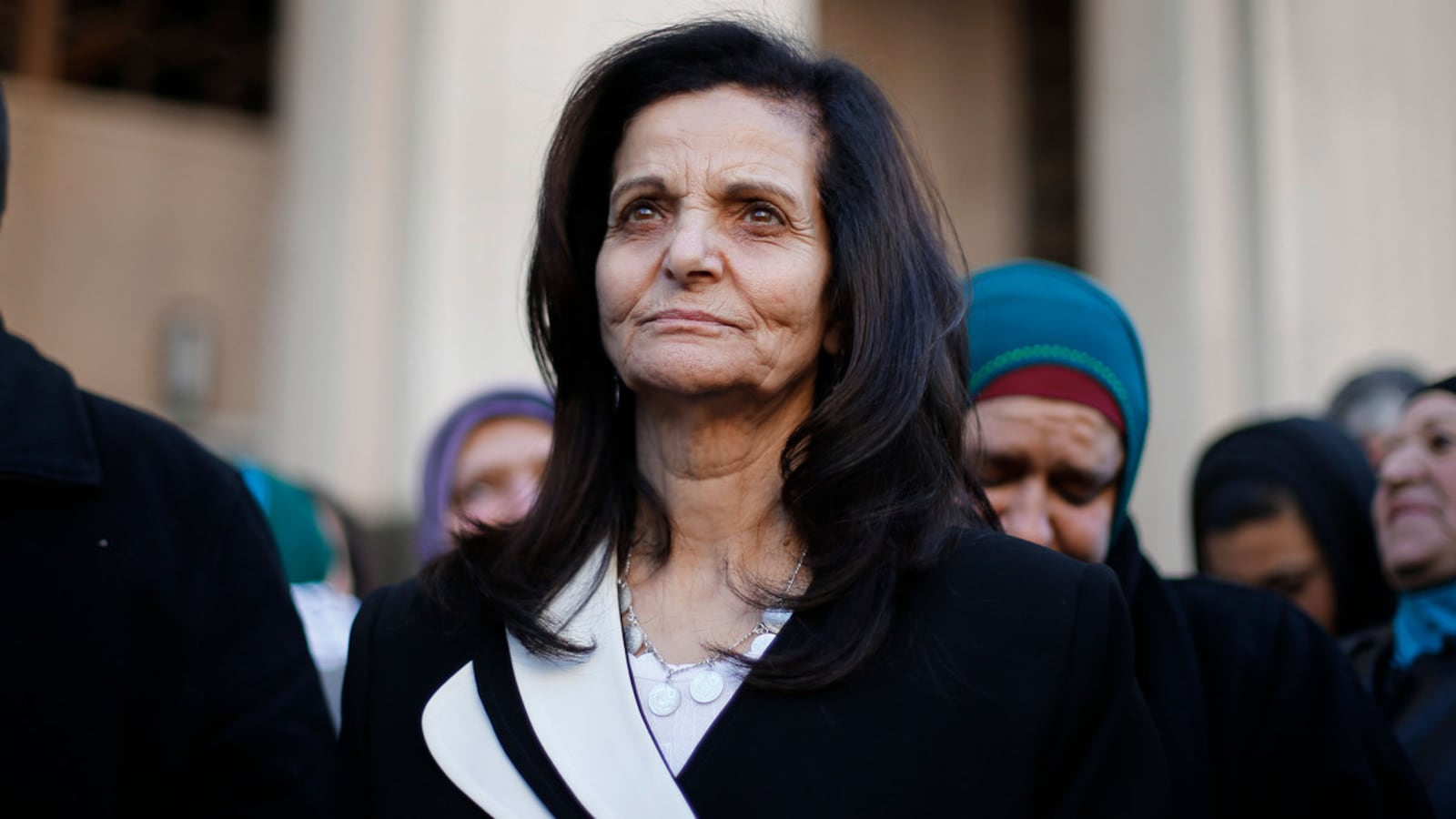In his new book, The Trials of Rasmea Odeh: How a Palestinian Guerrilla Gained and Lost U.S. Citizenship, Steven Lubet tells the remarkable story of Rasmea Odeh. A Palestinian woman from the West Bank town of Ramallah, Odeh was convicted for murder in Israel in 1969, following a deadly bombing in Jerusalem’s largest supermarket. Twenty-five years later, however, Odeh was not serving a life sentence in an Israeli prison but instead starting a new life in the United States, first in Detroit and later in Chicago, eventually becoming a naturalized citizen and working as a community organizer. Her arrest by federal authorities in 2013, and subsequent trial on charges of unlawful procurement of citizenship brought progressive activists to her defense, even as the facts of the immigration case, the Israeli conviction, and Odeh's early life were obscured or ignored.
Although sentenced to two life terms in prison for her role in the Jerusalem supermarket bombing and another bombing at the British consulate, Odeh was released in a prisoner exchange with the Popular Front for the Liberation of Palestine (PFLP) on March 14, 1979. Three months later she was in Geneva, testifying about her ill-treatment in Israel before a session of the UN Special Committee investigating human rights violations in the occupied territories.
Within the first minutes of her testimony, Odeh began lying about her participation in the PFLP’s guerrilla operations. She told the committee that she had never had explosives in her home, that she knew nothing about Palestinian commandos or resistance, and that she had no involvement in the Jerusalem bombings or other “military operations.” As we will see, all of these assertions were untrue and have been flatly contradicted by Odeh’s own words in later interviews as well as by other participants in the bombing.
Shortly after appearing in Geneva, when she was living in Beirut, Odeh was interviewed by the Lebanese journalist Soraya Antonius, to whom she described her involvement with the PFLP and her commitment to “military action,” thus contradicting her own sworn testimony. Odeh also admitted her part in the British consulate operation:
We had placed a bomb there to protest Britain’s decision to furnish arms to Israel. Actually we placed two bombs, the first was found before it went off so we placed another.
I didn’t do it for money, I was trying to defend my home, and that real honor lay in fighting and rejecting the occupation of our country.
In a 1990 interview with the American academic Amal Kawar, conducted in Amman, Jordan, Odeh acknowledged having been among the women “active first as guerrillas,” and she identified herself as a member of the PFLP Central Committee.
In addition, one of Odeh’s codefendants has repeatedly named her as among the bombing conspirators. In a 2004 Palestinian documentary titled Women in Struggle, Aisha Odeh (no relation to Rasmea) admitted placing the lethal bomb in the Jerusalem supermarket and explained that she had participated in the implementation rather than planning. “Rasmiyeh Oudeh was more involved than I was,” she said. “I placed the bombs,” but Rasmea “scouted the location and chose the targets.” With Rasmea sitting next to her and smiling, Aisha thanked her for “dragging me into military work.” Buthina Canaan Khoury, the filmmaker who conducted the joint interview, recognized that Rasmea had acknowledged her involvement in the bombing, saying, “She was a Palestinian at that time and she acted like the rest of the Palestinians would act.” Women in Struggle was widely distributed, winning awards at the San Diego Film Festival and the Al Ismailia Film Festival in Egypt.
More recently, in a 2013 interview on Palestine television, Aisha described her “armed activity” as a PFLP operative and named Rasmea as a member of the cell that carried out “an operation in western Jerusalem” in February 1969, in which “two were killed” and many wounded. Aisha was even more specific in her Arabic-language memoir, published in Amman, Jordan, explaining how she and Rasmea assembled the bombs with the assistance of an “explosives expert” at Rasmea’s house in al-Bireh.
Another of the bombing conspirators who appeared in Women in Struggle, Rasheida Obeideh, was never apprehended by the Israelis, having successfully crossed into Jordan before she could be arrested. In 1993, Obeideh was interviewed in an Arabic-language video about Palestinian women, in which she described organizing cells and collecting weapons to resist the Israeli occupation. Recognizing that some of their planning had been haphazard, she explained that she and her colleagues “did not have the patience” to delay “military attacks.” Regarding “the operation on the super sol in Jerusalem,” Obeideh said “me and my friends Aisha and Rasmieh participated in the one operation.” Finally, Odeh’s own father, Yousuf Odeh, who was a naturalized American citizen, admitted to a U.S. consular officer that he had been “present when police found explosives” in her bedroom.

For European and American audiences, Rasmea Odeh has presented herself as the innocent victim of an Israeli frame-up, in which a false confession was extracted by torture. There is no doubt that she was fiercely brutalized by her interrogators, leading to a confession that would not be admissible in American courts. But inadmissibility does not change the reality of her participation in the deadly bombing. Confessions may be coerced from the innocent and guilty alike, and Odeh has freely admitted her participation in the supermarket bombing—although only when speaking Arabic.
And why not? In most of the Arab world, armed struggle against Israel is a matter of pride, rather than something to be concealed. As one of the first young women to engage in guerrilla operations against the occupation of her homeland, Odeh is therefore someone to be celebrated, as indeed she has been in the Arabic press. Upon her arrival in Jordan, following deportation from the United States, the Arabic language news site Arab 48 reported that “the struggler Rasmea Odeh” had conducted an operation “in the heart of Jerusalem” that resulted in killing two Israelis and injuring nine others. A release from the Palestine Information Center also praised Odeh as having resisted the occupation “with all of her power and determination,” including participation in “the military resistance” and involvement, with Aisha Odeh, in the Jerusalem bombing.
Odeh’s false assertions of innocence served her well as both public relations and legal strategy. Israel’s security services could be condemned even more when shown using violent interrogation techniques on innocent civilians chosen at random. Likewise, her defense to the U.S. charges of immigration fraud could be made more convincing, and attract more popular support, when she was portrayed as a torture victim rather than a guerrilla operative. In large part, the stratagems were successful. The U.N. Special Committee members asked Odeh no questions about her role in the bombing, and numerous community organizations rallied to her side during the U.S. prosecution, all of them assuming that her Israeli conviction had been a complete miscarriage of justice. In 2017, Odeh was the keynote speaker at the national membership meeting of JVP, where she was applauded as a symbol of “Palestinian resilience” while her “false confession” was dismissed as purely the result of Israeli coercion.
The full story of Rasmea Odeh, however, requires a greater recognition of the actual facts. Whether regarded as a terrorist or freedom fighter, and despite how cruelly she was treated by her Israeli interrogators, Odeh was
undoubtedly a participant in the 1969 bombing operation that took two lives in Jerusalem.
In 1995, Odeh was living in Jordan, enjoying what she later called “the best period in my life.” As she recalled, “I have two jobs, I have a house, I have a car, I have a bank account, and I was happy there.” Unfortunately, her father had developed a malignancy and needed to be treated in the United States. Odeh’s brother Mustafa, who was living in Stockbridge, Michigan, asked her to move there to take care of their father. As the only unmarried daughter, she agreed. Odeh applied for an immigrant visa at the U.S. embassy in Amman, providing multiple untruthful answers on the form. Asked to list “all places you have lived for six months or longer,” her only answer was Amman, Jordan, omitting her lengthy imprisonment in Israel and the four years she had spent in Lebanon. Most significantly, she denied that she had ever been convicted of “offenses for which the aggregate sentences were 5 years or more,” despite her two life sentences for murder and ten years of actual imprisonment.
No one questioned or challenged Odeh’s answers. Her visa was issued and she arrived in the United States on April 18, 1995, ready to begin a new life that would eventually lead to citizenship. Her application remained on file, but her false statements would not be discovered for almost twenty years.
Reprinted from The Trials of Rasmea Odeh by Steven Lubet, published by George Mason University Press and distributed by the University of Virginia Press, copyright 2021





